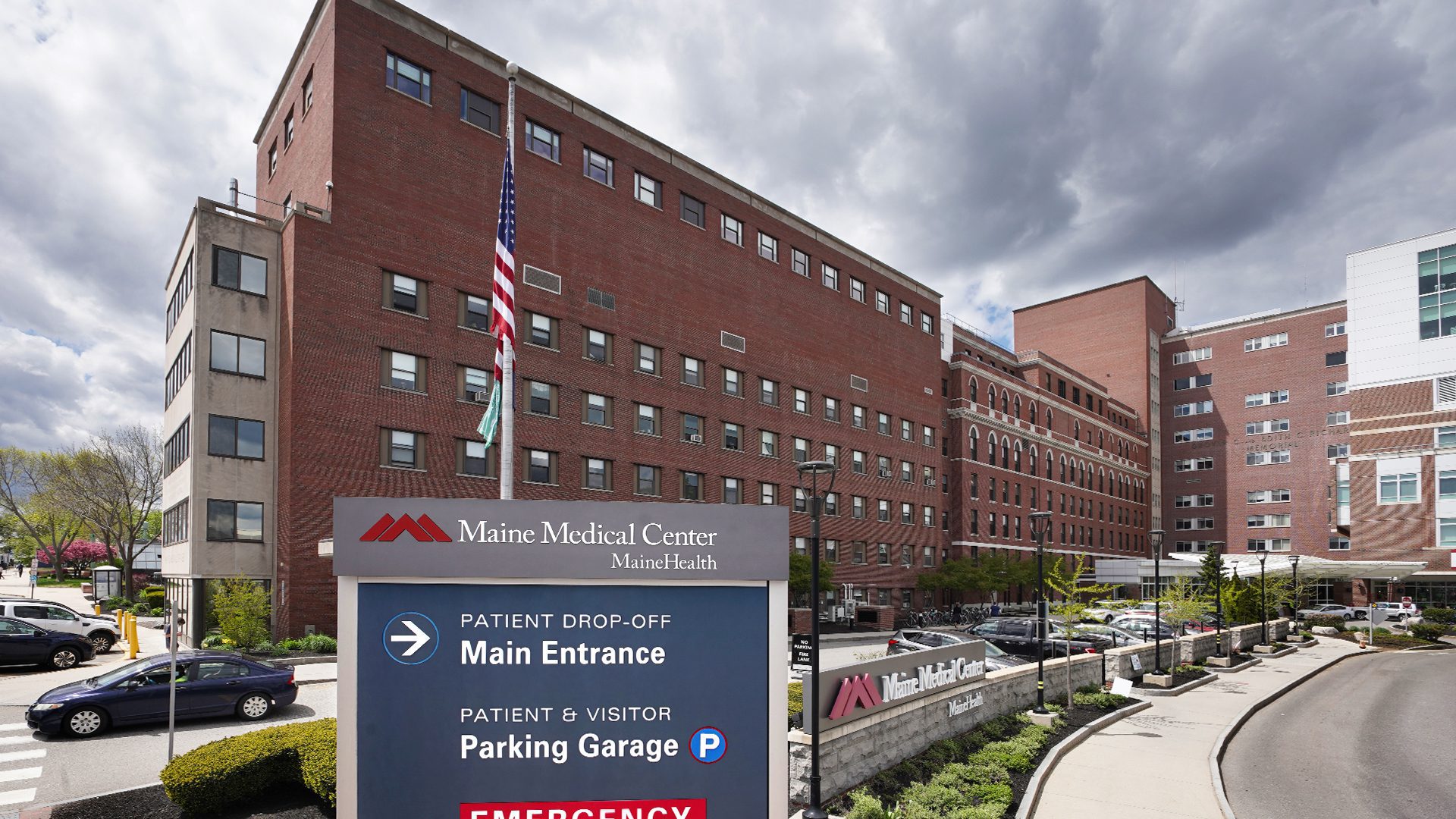The Maine Department of Health and Human Services is collecting employee vaccination rates for each hospital in the state, numbers it is expected to post publicly for the first time.
The increased attention on staff immunizations signals the importance that state health experts place on doctors, nurses, nursing assistants and other healthcare workers getting vaccinated, both to protect vulnerable patients and to set a good example for the rest of Maine.
While a Maine Hospital Association survey of 32 hospitals across the state this week found an average employees vaccination rate of 76% — higher than the statewide average — some Maine hospitals and other medical facilities fall well below that mark.
Shining a hospital-by-hospital spotlight on employee vaccination rates could pressure lower-performing hospitals and their staffs to be vaccinated.
Dr. Dora Anne Mills, chief health improvement officer for MaineHealth and former director of the Maine Center for Disease Control and Prevention, told The Maine Monitor that it’s important for the public to know the vaccination rates at nursing homes and hospitals, the same as any other safety rating. The information helps patients decide where to seek care and informs officials who are trying to control outbreaks.

The fact that vaccination rates for Maine hospital employees are higher than the general population is a testament to the success of the vaccines, she added.
“They have scientific health knowledge or they have professional knowledge of COVID-19 because they’ve been taking care of COVID-19 patients,” Mills said of hospital employees. “(The vaccine) has not been required and yet they either have some knowledge or experience that tells them that the vaccines are very effective.”
About 81% of staff at Maine Medical Center are fully vaccinated, Mills said. And 76% of all MaineHealth staff have received both shots.
Hospital staff vaccination rates across the state range from 58-93%, but most hover around 70-80%, said Steven Michaud, president of the Maine Hospital Association, which recently surveyed its 36 member hospitals.
“While we are very encouraged by the fact that three-quarters of our employees are vaccinated, we know there is a lot more work to do to get those numbers up,” Michaud said. “It is job No. 1 for us right now.”
Jackie Farwell, DHHS spokeswoman, told The Maine Monitor that the state’s data on staff vaccinations will become available to the public this month. The federal government already requires nursing homes to report staff immunization rates, so the state is additionally requiring hospitals and other healthcare facilities to do the same.
“Getting vaccinated against COVID-19 protects healthcare staff, the patients and residents they serve, and their broader communities,” Farwell said. “DHHS will publicly post healthcare staff vaccination rates each month to encourage ongoing vaccination of healthcare staff and inform the public about the risk of COVID-19 transmission in these settings, which serve Maine people at high risk of serious illness or death from the virus.”
National vaccination rates among healthcare workers generally have fallen below President Joe Biden’s goal of vaccinating 70% of eligible Americans by July 4. A national survey reported this month by USA Today found that vaccination rates at 276 hospitals ranged from 53-72% — slightly below the Maine average.
Houston Methodist made national news last month when 117 staffers filed a lawsuit against the hospital system’s mandate that all employees be vaccinated. A federal judge dismissed the lawsuit on June 12, finding that hospitals can require it.
When speaking about general vaccine hesitancy during a press briefing Wednesday, Dr. Nirav Shah, director of the Maine CDC, underscored the role that health professionals play as trusted messengers who can convince patients that it is safe and effective to get vaccinated.

“If you trust your doctor to help guide you in every other area of your healthcare life, then why not do the same when it comes to COVID-19?” Shah asked.
For the general population, Maine is one of the most vaccinated states, with 56% of its population fully vaccinated, according to the Maine CDC. Bloomberg’s Vaccine Tracker, which has slightly different numbers than the state, ranked Maine second with about 59%, behind only Vermont with 63%. The national rate is about 44%.
However, vaccination rates in Maine differ among counties and seem related to new case rates. Cumberland County leads the state with nearly 68% of its population fully vaccinated. Lincoln and Knox counties are next with about 63% each. Somerset and Piscataquis counties had the lowest vaccination rates with 44% and 46%, respectively.
The new daily COVID-19 case rate per capita over the last 30 days for Cumberland, Lincoln and Knox counties were about 13, 21 and 11 per 10,000 people, respectively. In Somerset and Piscataquis counties, the new daily case rates were about 34 and 33 cases per 10,000 people, respectively.
Gov. Janet Mills on Wednesday announced a new sweepstakes to encourage more Mainers to get vaccinated before the Fourth of July. One vaccinated winner will receive a cash prize equal to the total number of Mainers who have received one dose of the vaccine. Participants can sign up online or call 1-888-445-4111.
Cases in Maine have steadily declined over the past couple months. The seven-day average of new cases on April 15 was 444. On June 15, it was 46. On June 14, the state recorded 13 new cases, the fewest since October, Maine Public reported.
Over the past two weeks, hospitalizations have fallen 63% from 87 to 32 on Wednesday.
As cases decline, it will be important to turn up the intensity of contact tracing to learn more about outbreaks, Shah said on June 9. When Maine had hundreds of new cases a day, it was difficult to investigate each one. But as the state reaches a level of population immunity, new cases will be “slightly more outbreak-driven than community transmission-driven.” This means it will be important to pinpoint pockets of outbreaks to tamp them down.
Since the start of the pandemic, more than 68,700 Mainers have gotten COVID-19, more than 2,000 have been hospitalized and 854 have died.
Gov. Mills on Wednesday stressed that the pandemic is not over.
“There’s no declaration as there is when you finish a battle or finish a war. There’s no peace treaty signed,” she said. “There’s great progress being made by our state in particular that we’re very proud of. There’s still people in the hospital, there’s still people in ICUs, there’s still people getting sick. So the virus is still among us.”
Alzheimer’s drug approved
In other health news, a drug to treat Alzheimer’s disease was approved by the U.S. Food and Drug Administration earlier this month — the first new treatment for the memory-damaging brain disorder approved since 2003.
Aduhelm received accelerated approval, which can be used for treatments to serious or life-threatening illnesses. Three studies examined a total of 3,482 patients.
“Currently available therapies only treat symptoms of the disease; this treatment option is the first therapy to target and affect the underlying disease process of Alzheimer’s,” said Dr. Patrizia Cavazzoni, director of the FDA’s Center for Drug Evaluation and Research, in a press release.
Alzheimer’s, an irreversible disorder that erodes memory and thinking skills, affects about 6.2 million Americans.
More than 29,000 Mainers live with the disease, according to the state’s chapter of the Alzheimer’s Association
Study links deaths to car pollution
A study published this month in Environmental Research Letters found that car pollution in 2016 killed an estimated 7,100 people in 12 states, including 74 Mainers. Researchers reviewed data on ozone and particulate matter from vehicle emissions to calculate the deaths.
The “monetized health damages” in Maine from vehicle emissions was $762 million.
The states with the highest death tolls — New York, Pennsylvania and New Jersey — also faced the highest financial tolls from the health effects: $21 billion, $13 billion and $12 billion, respectively.
The study also found that the vehicle emissions could impact people living downwind in other states. In Maine, 25 of the premature deaths were caused by in-state emissions. That means two-thirds of the deaths were caused by out-of-state emissions.
“It is my hope that the results from this study will help demonstrate how serious air pollution from vehicles is to people living not only near high-traffic areas but also those living downwind of them,” said Calvin Arter, lead author of the study and a graduate research assistant at UNC-Chapel Hill, in a press release. “And in doing so, provide the impetus for a collaborative approach to reducing the health impacts associated with on-road transportation-related air pollution.”
In case you missed it
Gov. Mills announced that the Civil State of Emergency would end June 30, about 16 months after it was declared in response to the COVID-19 pandemic.
Maine Medical Center this week received a $25 million donation — the largest amount the hospital has received in its 150-year history, according to a press release. The hospital will name its newest building, under construction on Congress Street, the Malone Family Tower, in recognition of the large donation from John and Leslie Malone.
With the number of Americans over 65 expected to nearly double over the next four decades, Kaiser Health News published data visualizations about what it will take — and cost — to care for them.







